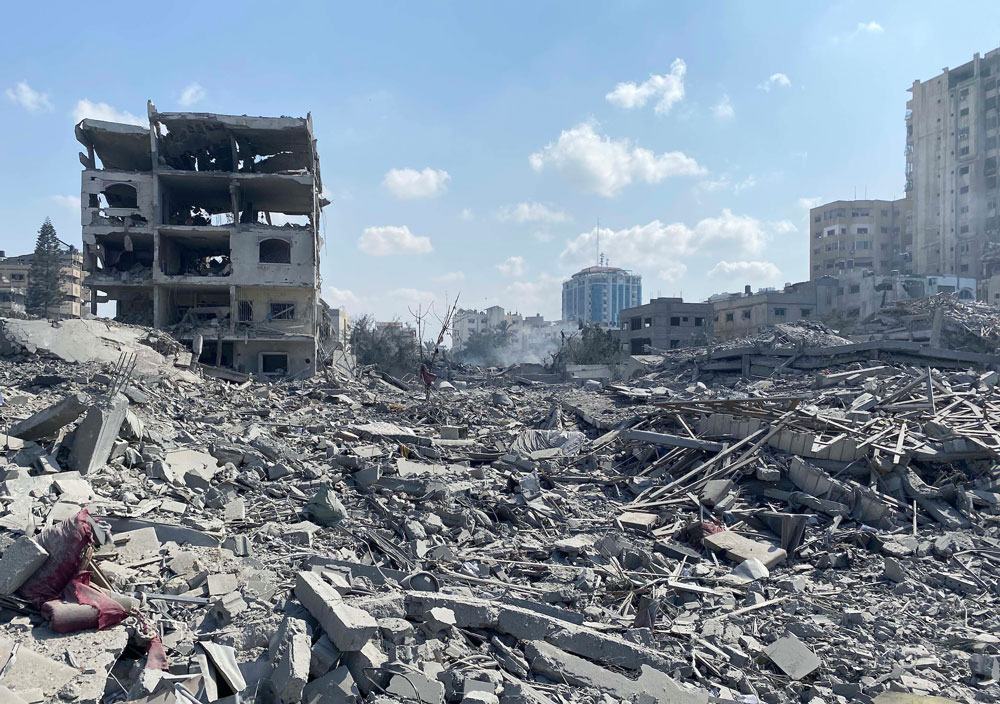Written by Amin Saikal
Arab and Muslim nations have been utterly ineffectual in addressing two of the most pressing issues facing the Muslim world today: the destruction of Gaza and the Taliban’s harsh reign in Afghanistan.
The Organization of Islamic Cooperation (OIC), their main body, has been very strong on rhetoric but very weak on concrete, meaningful action.
The OIC is made up of 57 primarily Muslim states and has its headquarters in Saudi Arabia. In addition to making decisions and recommendations on the main issues affecting Muslims worldwide, it is expected to serve as a consultative and representational body. It refers to itself as the Muslim world’s united voice.
However, Israel’s unrelenting onslaught on Gaza, which was sparked by the October 7, 2023, Hamas attacks, has shown the body to be toothless.
In the ethnically diverse country of Afghanistan, the OIC has also done little to stop the Taliban’s reign of terror in the name of Islam.
Many strong statements
The OIC has shamefully been split on Gaza and Afghanistan, despite its portrayal of a united umma (the global Islamic community, as articulated in my coauthored book, Islam Beyond Borders).
Indeed, it has denounced Israel’s actions in Gaza. Additionally, humanitarian help for the malnourished people of the strip and a quick, unconditional ceasefire are demanded.
Additionally, it has opposed any Israeli attempt to annex the West Bank and depopulate the region. The two-state solution to the protracted Israeli-Palestinian conflict would be effectively nullified by these actions.
The OIC has also praised France’s decision to recognize the state of Palestine and the recent joint statement by the foreign ministers of 28 nations, including the UK, numerous EU members, and Japan, asking for an immediate ceasefire in Gaza.
The OIC is skilled at making announcements. This strategy hasn’t deviated significantly from the global community’s attitude, nevertheless. It lacks any concrete actions and is primarily verbal.
What the group could do for Gaza
Muslim states can and ought to be doing more, no doubt.
For instance, in opposition of Israeli officials, the OIC has not succeeded in getting Egypt and Jordan, Israel’s neighbors, to open their border crossings so that humanitarian supplies can enter Gaza, the West Bank, or Israel.
Furthermore, until the Jewish state accepts a two-state solution, it has not been able to force Egypt, Jordan, the United Arab Emirates, Bahrain, Sudan, and Morocco to halt its relations with Israel.
Furthermore, Malaysian Prime Minister Anwar Ibrahim and Francesca Albanese, the UN special rapporteur on Palestinian territory, have called for Israel to be suspended from the UN, but the OIC has not embraced their proposal.
It has also not called on its oil-rich Arab members, especially Saudi Arabia and the United Arab Emirates, to use their resources to compel Israeli Prime Minister Benjamin Netanyahu to terminate the conflict and US President Donald Trump to stop supplying Israel with weapons.
Stronger action on Afghanistan, too
Similarly, the OIC has not done enough to put pressure on the Taliban government in Afghanistan, which is ultra-extremist and was once a terrorist organization.
The Taliban have ruled in the name of Islam in a harsh, misogynistic, and extremely authoritarian manner since retaking power in 2021. Nowhere else in the Muslim world is this practiced.
OIC Secretary General Hissein Brahim Taha called for a worldwide effort to bring together religious leaders and Islamic experts in opposition to the Taliban’s proposal to forbid girls from attending school in December 2022.
However, this was overshadowed a month later when the OIC advised the international world to refrain from meddling in Afghanistan’s internal affairs while expressing worry over the Taliban’s restrictions on women. The Taliban embraced this with open arms.
In reality, the OIC and the majority of Muslim nations have not taken any concrete action to hold the Taliban accountable for its actions.
It has neither condemned the Taliban or placed the group under punishing sanctions. Furthermore, the majority of OIC members have interacted with the Taliban on a political, economic, financial, and trade level, despite the fact that no Muslim nation has formally recognized the Taliban government—only Russia has done so.
Why is it so divided?
The OIC is ineffectual for a variety of reasons.
First of all, the group’s members come from a variety of political, social, cultural, and economic backgrounds.
More significantly, though, it has not served as a bridge builder by creating a shared goal and course of action capable of bridging its members’ sectarian and geopolitical divides.
The organization has become nothing more than a talking shop in the current polarized international environment due to the competition between its member states and with major global powers like the United States and China.
This has made it possible for extreme regimes in Afghanistan and Israel to operate without consequence.
It’s time to examine the OIC’s operations and ascertain how it might better bring theumma together.
Its member states may also have the chance to create a successful shared policy that might support the cause of peace and stability in the Muslim world and its interactions with the outside world.
![]()
Amin Saikal is a Vice Chancellor’s Strategic Fellow at Victoria University and an Emeritus Professor of Middle Eastern and Central Asian Studies at Australian National University.







